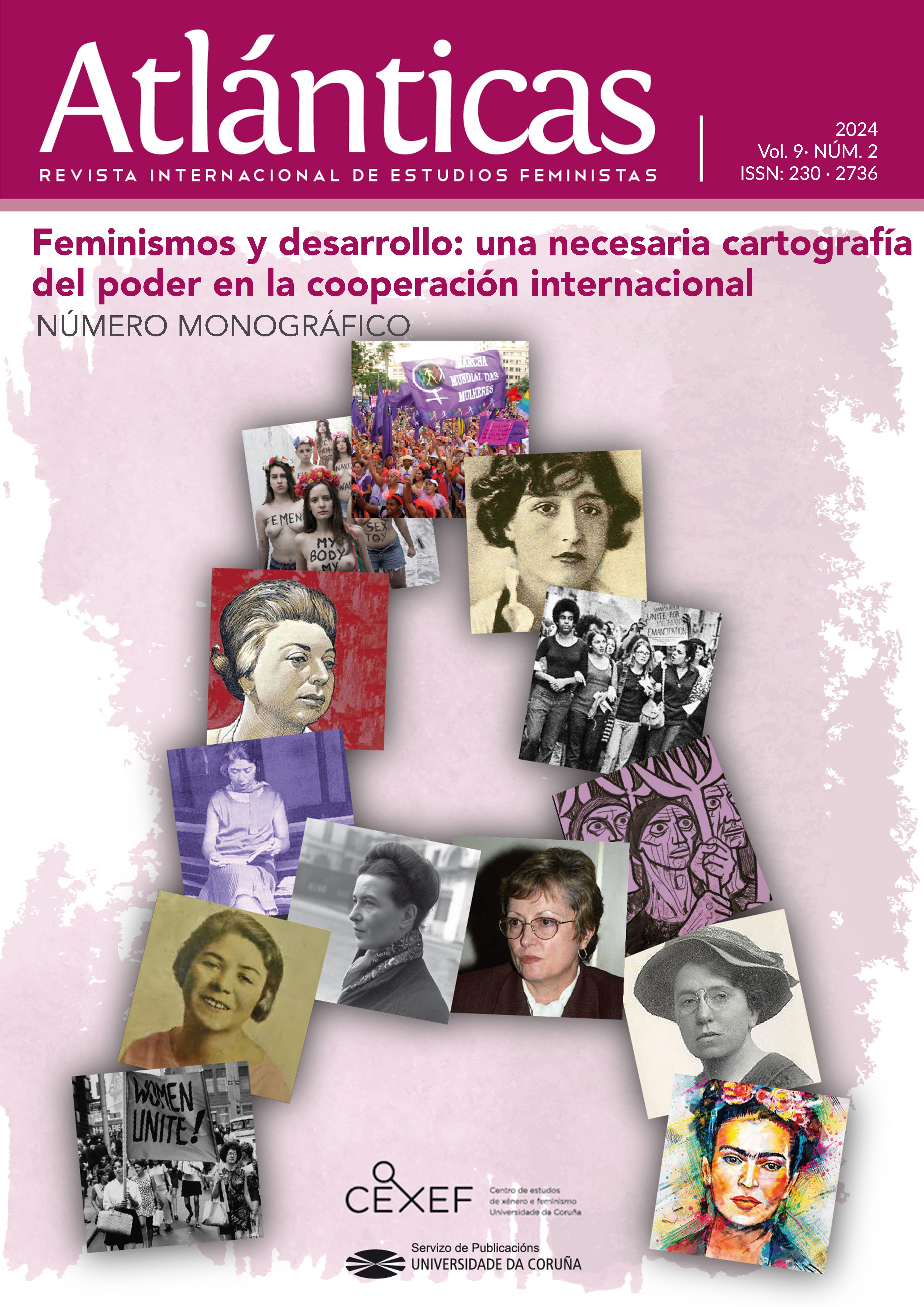Can Spanish cooperation become feminist?
DOI:
https://doi.org/10.17979/arief.2024.9.2.9804Keywords:
cooperation, development, feminism, development workersAbstract
This text tries to explain, from my experience as a development worker, the main challenges of the Spanish cooperation system in order to implement a feminist cooperation policy, taking advantage of the announced reform of the international cooperation system. Although the work on gender equality is one of the hallmarks of Spanish cooperation, its aesthetic use has been increasing in recent years, as in other sectors, coinciding with the fact that feminism has become fashionable and international cooperation has lost weight in society, in the world. This is compounded by several structural problems of official cooperation which affect the entire system and have been exposed for decades, without any concrete reforms to solve them. The model of international cooperation for development and humanitarian action that Spain is committed to depends on this. The disavowal of expert knowledge, both in cooperation and gender equality, are at the base of the challenges to be overcome. To implement feminist cooperation, it is necessary that feminism permeates within the organizations and that development workers have a greater voice in the cooperation system.
Downloads
References
de la Iglesa Caruncho, M. (2011). Política Exterior y Política de Cooperación: ¿Amistados Peligrosas? Lewes: Fundación Carolina.
Enloe, C. (2014). Bananas, beaches and bases. Making feminist sense of international politics. University of California. DOI: https://doi.org/10.1525/9780520957282
Espinosa Fajardo, J. (2014). La igualdad de género en la cooperación española y en la iniciativa Marca España. Abordajes e inconsistencias en tiempos de crisis. Investigaciones Feministas vol. 5. Madrid: UCM. DOI: https://doi.org/10.5209/rev_INFE.2014.v5.48135
Expansión (2019, septiembre 28). El gobierno de México es feminista: Marcelo Ebrard en la ONU. Recuperado 5 de abril de 2021 de https://politica.expansion.mx/mexico/2019/09/28/el-gobierno-de-mexico-es-feminista-marcelo-ebrard-en-la-onu
García del Real, M. A. (2015). La imagen e instrumentalización de la política de cooperación española. Madrid: Universidad Pontificia Comillas.
Global Affairs Canada (2017). Canada´s Feminist International Assistance Policy. Otawa: Global Affairs Canada.
Ley 1/2023, de 20 de febrero, de Cooperación para el Desarrollo Sostenible y la Solidaridad Global, BOE núm 44 A-2023-4512.
Ministère de L´Europe et des Affaires Étrangères (2018). Stratégie Internationale de la France pour L’égalité entre les Femmes et les Hommes (2018-2022).
Ministerio de Asuntos Exteriores, Unión Europea y Cooperación (2021). Política Exterior Feminista. Recuperado de https://www.exteriores.gob.es/es/ServiciosAlCiudadano/PublicacionesOficiales/2021_02_POLITICA%20EXTERIOR%20FEMINISTA.pdf
Olivié, L., y Pérez, A. (23 de mayo de 2016). Catorce dilemas de la cooperación española en la nueva legislatura. ARI 39/2016 Real Instituto El Cano. Recuperado de https://www.realinstitutoelcano.org/analisis/catorce-dilemas-de-la-cooperacion-espanola-en-la-nueva-legislatura/
Oxfam (2022). MÁS ALLÁ DE LAS PALABRAS. Hacia una política de cooperación feminista y transformadora. Madrid: Oxfam Intermón.
Pajarín García, M. (2021). Alcance Transformador de Género de las Agendas y de las Políticas de Desarrollo y de Cooperación Internacional: Análisis del Caso Español. Madrid: UCM.
Parlamento Europeo (2020). Informe sobre la igualdad de género en la política exterior y de seguridad de la Unión. A9-0145/2020.
SER. (2021, marzo 10). Entrevista completa a Arancha González Laya en 'Hora 25' con Pepa Bueno. Recuperado de: https://www.youtube.com/watch?v=OBIiyXzwamk
Thompson, L. (2020). Feminist Foreign Policy: A Framework. Washington, DC: Center for Research on Women.
Downloads
Published
How to Cite
Issue
Section
License
Copyright (c) 2024 Atlánticas. Revista Internacional de Estudios Feministas

This work is licensed under a Creative Commons Attribution-ShareAlike 4.0 International License.
Los y las autores/as ceden todos los derechos, título y materiales contenidos en el trabajo aceptado a la Revista Atlánticas, quien podrá publicar en cualquier lengua y soporte, divulgar y distribuir su contenido total o parcial por todos los medios tecnológicamente disponibles y a través de repositorios.
Se permite y se anima a los y las autores/as a difundir los artículos aceptados para su publicación en los sitios web personales o institucionales, ante y después de su publicación, siempre que se indique claramente que el trabajo pertenece a esta revista y se proporcionen los datos bibliográficos junto con el acceso al documento.

Los trabajos publicados en esta revista están bajo una licencia Creative Commons Reconocimiento-Compartir Igual 4.0. Internacional. Usted es libre de:
- Compartir — copiar y redistribuir el material en cualquier medio o formato
- Adaptar — remezclar, transformar y crear a partir del material para cualquier finalidad, incluso comercial.
Reconocimiento — Debe reconocer adecuadamente la autoría, proporcionar un enlace a la licencia e indicar si se han realizado cambios<. Puede hacerlo de cualquier manera razonable, pero no de una manera que sugiera que tiene el apoyo del licenciador o lo recibe por el uso que hace.
CompartirIgual — Si remezcla, transforma o crea a partir del material, deberá difundir sus contribuciones bajo la misma licencia que el original.
En relación con la incusión de los artículos, reseñas y entrevistas en repositorios debemos señalar lo siguiente:
a) Se autoriza sólo a subir la copia post-print del editor, es decir, la última versión qeu fue publicada, con el mismo formato y apariencia. Los derechos sobre el documento deben mantenerse respecto de la publicación original.
b) Sólo se autorizará el alojamiento en repositorios y plataformas gratuítos, que no cobren ni por el alojamiento ni por la consulta o obtención de documentos.
c) En el repositorio o plataforma dónde se aloje, el documento debe identificarse con los datos completos de publicación de esta copia post-print, lo que incluye su DOI cuando lo tuviese.
d) En ese documento ya tiene un alojamiento electrónico en una revista OJS o en el RUC de la UDC, es deseable incluír un vínculo en el nuevo repositorio o plataforma, y no alojar el documento en si (esto facilita la visibilidad del RUC y las revistas de la UDC, la ayuda a revalorizar los libros y revistas hechos por el profesorado). Si esta opción no es vialbe, se podrá alojar el documento, pero siempre identificándolo con datos completos de publicación (lo que incluye su DOI, en caso de tenerlo).

